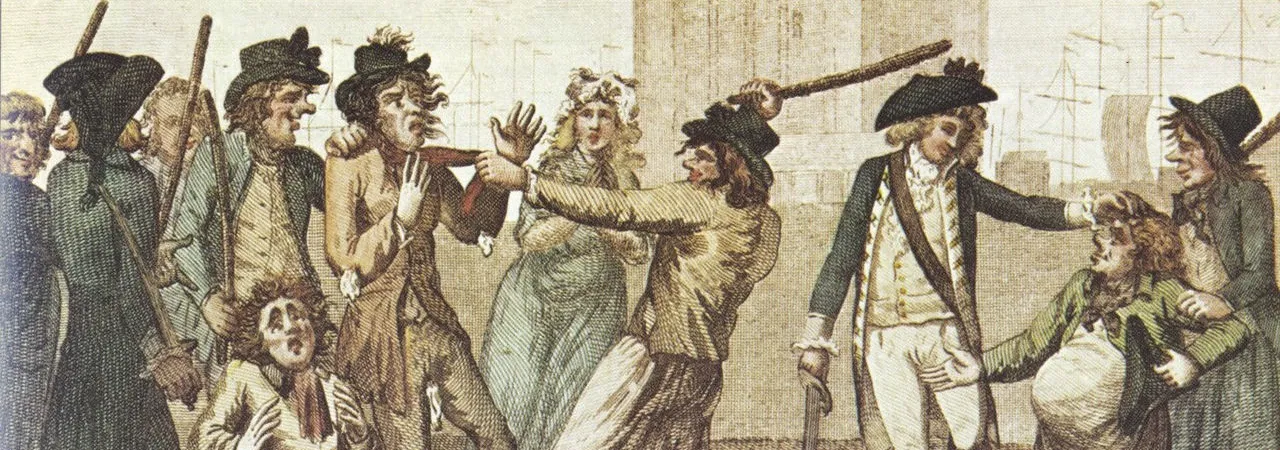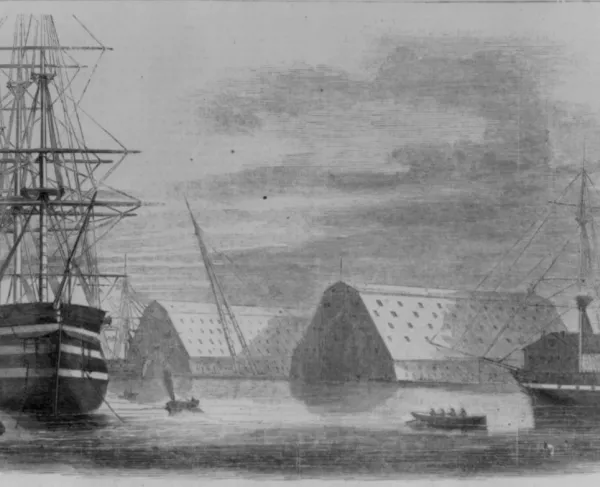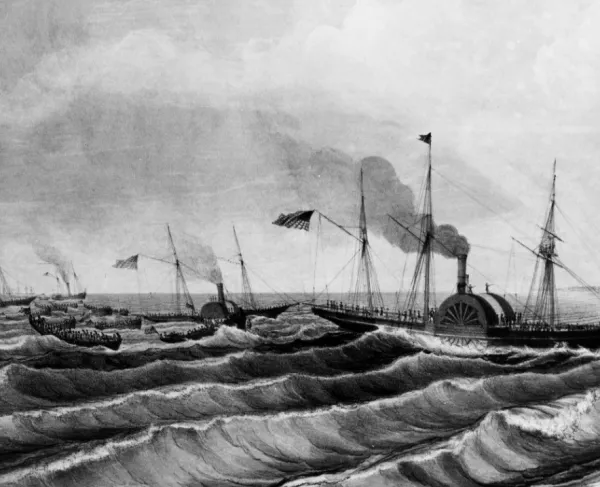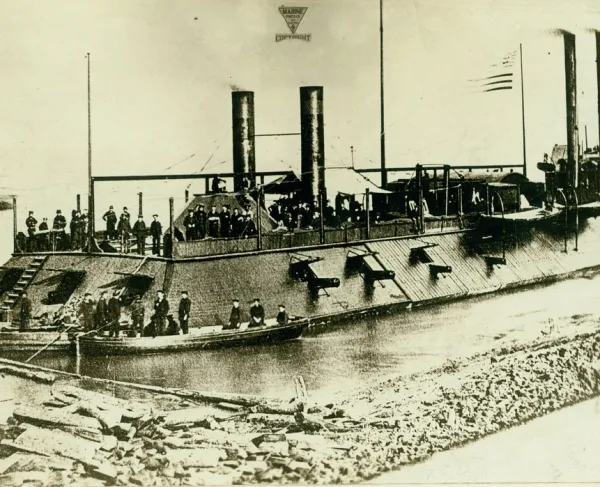
1780 Caricature of a Press Gang
At the end of the 18th Century and early 19th Century, “Britannia ruled the waves” with the strongest navy in the world at that time. The British navy protected the island nation and its vast maritime economic ventures and expanding global empire. During time the French and Napoleonic Wars, the British navy tripled in size, and seamen were needed to crew the ships—leading to impressment.
Impressment—the practice of forcing seamen to serve the British Royal Navy—was a long-standing military tradition. Formally dating back to 1563 when Queen Elizabeth I authorized impressment to forcibly recruit for the navy, the practice remained legal into the early 20th Century. In 1641, Parliament considered abolishing impressment, but that did not happen. In 1740, an act tried to regulate impressment by instituting that no one under 18 or over 55 and no foreigners could be forced into the navy; however, these regulations were withdrawn in 1780. British courts heard cases and considered the legality of impressment at the end of the 18th Century but ruled that it was legal if done in a regulated way, overseen by an officer holding a king’s commission and with a warrant of impressment from the British Admiralty. American seamen were sometimes forced into the British navy, and the continuation of this practice was one of the stated causes of the War of 1812.
British impressment focused on finding seamen from the civilian merchant ships and forcing them into military service. Since it took several years to effectively train a seaman in their tasks, it was easier to impress men who were already sailors than to take landsmen into service. Impressment became a vicious cycle that limited shore leave for navy sailors since they might desert, but the lack of shore leave, long wars, and distant voyages in poor living conditions made seamen less likely to want to serve, continuing impressment to fill ship quotas. Under idealized circumstances, sailors would be impressed into the navy just for the brief duration of a war and then return to merchant employment when the conflict ended; this might have worked during the 16th and 17th centuries, but by the French and Napoleonic Wars, the length of the conflict and the voyages to distant parts of the British empire essentially trapped the impressed sailors for long periods. When the navy was mobilizing, the British government implemented temporary embargoes to prevent merchant ships from leaving ports until the navy’s crews had been filled.
In Britain, press gangs searched taverns, streets, and businesses for civilian seamen. The press gangs could be organized by a particular ship needing to fill its crew or a shore-based press gang finding seamen that would be distributed among multiple ships. There were seamen and maritime workers who could be exempted from impressment if they could provide proper documentation. For example, apprentices were supposed to exempt; they still might be seized, but if they could provide the proper documents or witnesses, they would be released. Some men forged protection papers or resorted to various methods of hiding from active press gangs. In some situations, civilians attacked press gangs to release taken men. Overall, British citizens resented impressment, seamen tried to avoid it, and merchantmen and shipowners disliked the disruption to their business ventures. Historian Brian Lavery points out in Nelson’s Navy that “In theory [foreigners] were exempt from impressment, but those serving in British merchant ships would often be picked up, and at sea there was no effective right of appeal.”
By comparison, the French navy used a type of conscription of seamen to recruit their navy during periods of war. The Spanish also practiced conscription, but lacking a large enough merchant fleet, they conscripted landsmen to serve in their navy, too. The United States, though still a fledging country and comparatively tiny navy, did not practice impressment. Instead, the United States navy ships recruited for set enlistment periods, offered advance pay and had notably better living conditions than European navies. These options drew willing volunteers from among the United States’ merchant seamen. An estimated 5-10% of the men in the United States navy had served in the British navy, mostly had been previously impressed and brought maritime fighting skills and training with them into the American ships.
The better conditions and pay on American merchant or navy ships drew deserters from British navy, and British officers used this known fact as excuse to stop American ships to look for deserters or impress men they claimed were British citizens. Historian Brian Lavery notes, “Conflict with Britain developed slowly over the years, due to the interruption to American trade caused by the British blockade, and to the British custom of boarding American ships to search for alleged British citizens or deserters. Americans found it very difficult to prove their nationality to a press gang, even with certificates from their consuls and State governors.” By 1812, the US State Department had recorded that at least 6,257 American citizens had been impressed into the British navy. It is possible that number may have been much higher or even double. When the War of 1812 started between the United States and Britain, 2,548 of the Americans impressed into the British fleet refused to work and were sent to prison.
Merchant maritime trade conflicts brewed between the United States and Britain for years. On June 8, 1793, British captain received council orders to stop food cargo from entering France. Thomas Pinckney, the United States ambassador, objected, echoing President George Washington and Secretary of State Thomas Jefferson’s insistence on the neutrality of commerce. Britain disregarded American protests and used the council orders as reason to stop American ships and search for sailors to impress into the British Navy. On November 6, 1793, British captains were allowed to stop, search, and seize any American ship routed to a French port or carrying French exports; this order was implemented immediately but kept secret for 3 months, allowing the British to plunder American shipping and capture more than 300 vessels before United States leaders realized the systematic encroachment.
Over the next decades, British captains continued to board and search American ships and impressment increased. As Britain continued to fight Revolutionary France and then Napoleon Bonaparte, the constant need for naval crews ramped up the numbers of impressments at home and from neutral nations’ merchant shipping. From the British perspective, they were saving the western world from Napoleon by all means within their reach. However, Americans—generally trying to avoid the European conflict—found forced military service in the ships of a foreign nation to be personally and nationally insulting. In response to the trade restrictions and impressment, the U.S. Congress passed the Non-Importation Act in 1806, followed by the Embargo Act of 1807. These restrictions crippled the United States economy, but had little effect on the European powers.
On December 31, 1806, James Monroe and William Pinkney signed an agreement with Britain, which included the informal limitation of searches and impressment and the end of impressing proven U.S. citizens. Britain refused to make these points part of the formal agreement, however, and President Jefferson consequently refused to send the agreement to Congress since it did not officially address the impressment problem.
The impressment crises escalated in 1807 through the Chesapeake Affair. Five British sailors deserted and rowed to Norfolk, Virginia, where 3 joined the frigate USS Chesapeake. British officers protested, demanding that the deserters be sent back for punishment. Commodore James Barron of the Chesapeake refused to return the deserters, telling the ambassador that they were U.S. citizens who had been formerly impressed. When the Chesapeake departed Norfolk on June 22, 1807, a British warship—HMS Leopard—waited to intercept. Barron declined to submit to a crew inspection and the British fired on the Chesapeake, ultimately leaving 3 dead and 18 wounded. After Barron surrendered, four men were impressed; three were American citizens, one was a British deserter but from an entirely different situation.
The Chesapeake Affair angered both political parties—Federalists and Democratic-Republicans—in the United States. Anxious to stay out of a war, President Jefferson refused to seek armed retaliation or conflict. He instructed Ambassador James Monroe to seek for the complete abolition of impressment. The British refused Monroe’s pressure, but did admit to wrong-handling of the Chesapeake Affair and offered to pay restitution to the American families who had suffered casualties.
During President James Madison’s administration, British ships routinely hovered outside American ports to stop ships and impress sailors. When Madison asked Congress for a declaration of war against Britain, impressment was the first listed reason of the causes of conflict. Throughout the War of 1812 which lasted through the beginning of 1815, Madison declined to negotiate unless the British agreed to stop the practice of impressment on American ships.
World events altered the recruitment pressure on the British navy. In 1814, Britain and European allies defeated Napoleon, forcing the former Emperor of the French into exile on a Mediterranean island. As the immediate threat of war ended, the British navy started to decommission ships and officers and shrink its size of needed crews. As the United States and Britain worked to end their conflict through the Treaty of Ghent, impressment did not even feature in the negotiated terms. As Madison noted, “The causes for the war have ceased to operate.”
In Britain, the end of the Napoleonic Wars in 1815 also ended the era of strict impressment. A law passed in 1835 allowed for impressment to continue but limited the time of service to 5 years and strictly stated that no man could be impressed twice. Technically, British impressment continued into the early 20th Century, but it was not practiced on seamen of other countries. Impressment—though seen as a military necessity—created international conflict. Americans saw the practice as a threat to their national sovereignty and personal liberties, and in U.S. History, it is remembered as a cause of the War of 1812.
Further Reading:
Nelson's Navy: The Ships, Men and Organisation, 1793-1815 by Brian Lavery.
If By Sea: The Forging of the American Navy by George C. Daughan.





